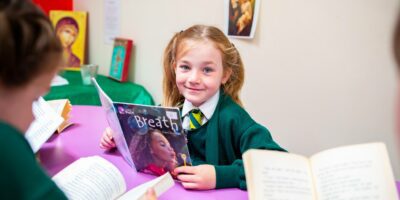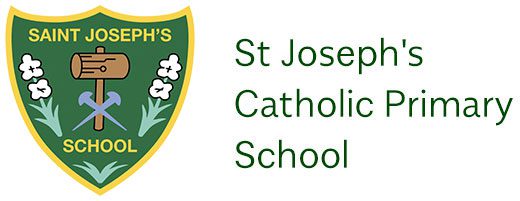“The more that you read, the more things you will know. The more that you learn, the more places you’ll go”
Dr Seuss
Early Reading and Phonics
At St Joseph’s Catholic Primary reading is at the very heart of our curriculum. It is our intent that all children will be a reader by the time they leave our school. From the start of their journey with us, children are supported to develop and nurture a love of reading. They are continually exposed to high quality texts and through a consistent and daily teaching of phonics, they are provided with the necessary skills they need to decode confidently and read fluently.

To teach reading at St Joseph’s we follow the Little Wandle Letters and Sounds Revised systematic and synthetic phonics programme. Throughout the teaching of the scheme children’s reading books are closely matched to the taught graphemes. These ‘decodable’ books are practiced in school reading sessions three times a week and then sent home for children to practice until fluent. The books offer the children a mixture of fiction and non-fiction texts, which challenge them at an appropriate level to ensure accelerated learning.
Parent involvement and partnership with school in their child’s educational journey is a key part of our phonics programme. We involve parents from the start of their child’s journey in school through phonics workshops to ensure that parents are onboard and supporting their child’s learning of phonics. These sessions are designed to help support parents to gain knowledge and understanding of what phonics is, how it is taught and helps parents to develop the skills to support phonics, early reading and writing at home. Further information about the Little Wandle programme for parents can be found at the link below.
Phonics Teaching
Foundation for Phonics
Daily phonics sessions are introduced from FS1, covering the seven different aspects of Phase One sounds. These include; environmental, instrumental, body sounds, rhythm and rhyme, alliteration, voice sounds and oral blending and segmenting.
There is a key focus on listening games, distinguishing between sounds and oral blending/segmenting. These foundation skills help to develop a child’s ability to listen to, make, explore and talk about sounds.
N2 children are also introduced to phase 2 graphemes to get children off to an early start in reading.
Little Wandle Phonics Programme
Phonics sessions from Reception onwards reflect the following structure:
- Revisit and review – Practise recognition and recall of previously taught letters. Practise oral blending and segmentation.
- Teach – Teach a new grapheme. Teach blending or segmenting using known and taught graphemes. Teach a new tricky word.
- Practise – Practise reading or spelling words using the taught graphemes.
- Apply – Read or write a caption or sentence using high frequency and decodable words.
These skills taught in the phonics sessions are then used to read decodable books in the Reading Sessions three times a week. Children are taught to use phonics as the approach to decoding an unfamiliar word.
At St Joseph’s Catholic Primary we adopt a mastery approach to teaching phonics. All children are taught in whole class groups and supported to access the age appropriate teaching content, with additional support given where required. The pace of the programme is maintained, with four new GPCs (Grapheme Phoneme Correspondence) and carefully selected ‘Tricky Words’ being introduced each week. Any children who struggle to keep up with the sessions, or who are not blending or reading fluently, will received additional daily phonics teaching and ‘keep up’ support.
Children in EYFS are taught how to apply their phonic knowledge independently and are provided with opportunities to practice and consolidate their skills in both reading and writing through continuous provision in the classroom. Children are also taught ‘Tricky Words’ in line with the Little Wandle phonics progression, these are then further practised through the continuous provision in the classroom to enable children to sequentially build their store of words to become fluent and confident readers across a wide variety of situations.
Guided Reading Sessions
All children in Reception and Year 1 have a guided reading sessions three times a week. These sessions last for approximately 15-20minutes and follow a similar format to the daily phonics sessions to help prevent cognitive overload. The sessions follow a format of ‘Revisit and Review’ followed by ‘Practise and Apply’.
The three sessions focus on a different aspect:
- Fluency
- Prosody
- Early Comprehension Skills
Some children will have further time built in during the week to read one to one with an adult, if required.
Some children also have the opportunity to share stories with their friends in school. Children in Key Stage one enjoy shared reading with their Year 6 reading buddies during their reading aloud sessions.
Classroom Reading Areas
Every classroom at St Joseph’s School has a high quality reading area with a wide selection of books covering all genres. There is a good mix of traditional old favourites and new and award winning texts. We also have a range of non-fiction texts linked to children’s topics and a variety of poetry and folk law stories. These books are regularly rotated and updated with age appropriate quality texts.
The texts chosen for each year group is not a random choice. These books are carefully picked to ensure they are age appropriate, developmentally appropriate for a range of children, and texts that will capture the interests of the children through shared experiences or exciting storylines. The texts are evaluated to ensure they are appropriate in a number of areas; semantic (word frequency), that they have an appropriate level of demand on the reader and have appropriate syntactic (sentence length) characteristics.
Some of the texts selected for the class reading areas are also linked to other curriculum areas or designed to further develop the children’s knowledge of the local area and environment.
Guided Reading Year 2 – Year 6
From Year 2 onwards, once children’s decoding skills are secure, the children at St Joseph’s Catholic Primary follow a Guided Reading programme that is designed to further strengthen their fluency skills whilst giving them the ability to practice their prosody and comprehension skills. We have adopted a whole class teaching approach to our Guided Reading based around the class teacher reading high-quality and challenging texts, which are then dissected by the class through high-level questioning and discussion.
The pupils are all regularly immersed in high-quality children’s literature where they are able to improve speaking and listening skills, as well as developing their comprehension skills. The approach allows more time to be given to modelling skills and all children have access to the same activities and level of questioning with differing levels of support dependent upon the children’s individual needs.
The session format is the same across all year groups:
- The teacher reads the text to the class, modelling fluency, prosody and comprehension, and the pupils have their own text to follow.
- Children then re-read the text individually, or with support if required.
- Children work on activities that help them to develop their comprehension of the text.
- Children discuss the contents of what they have read answering a number of questions verbally in a book club, with adult support if required.
“We all have a responsibility to instil in our children a love of reading so that we can give them a chance to fulfil their dreams”
Barack Obama

Throughout the school the children have access to a variety of literature linked to different topics and curriculum areas. For example we have books about democracy linked to our Pupil Voice area, healthy eating books close to where the children eat their dinner and books about computing in our ICT area.






